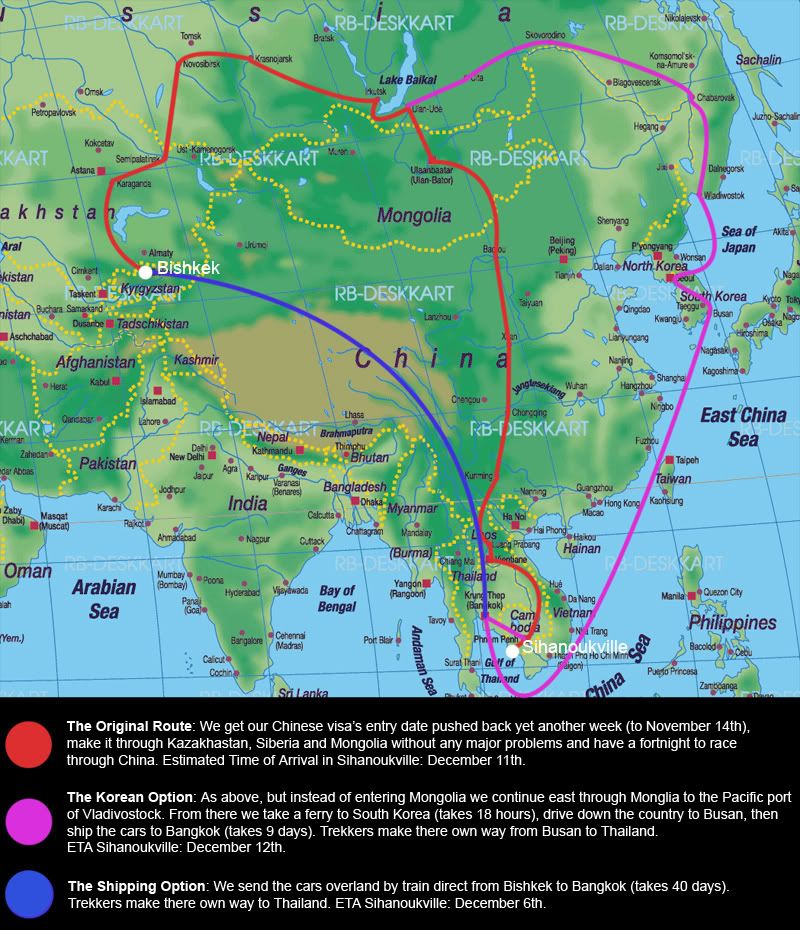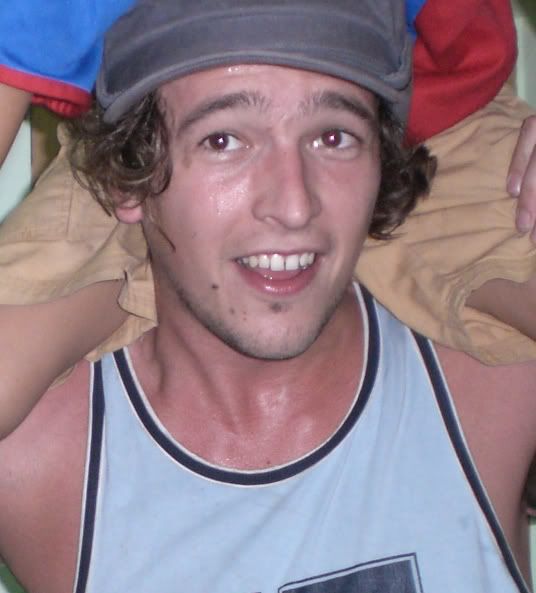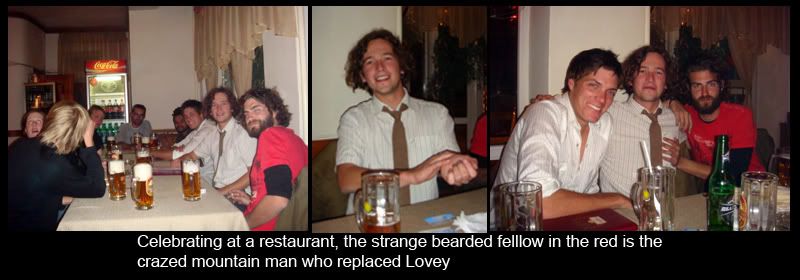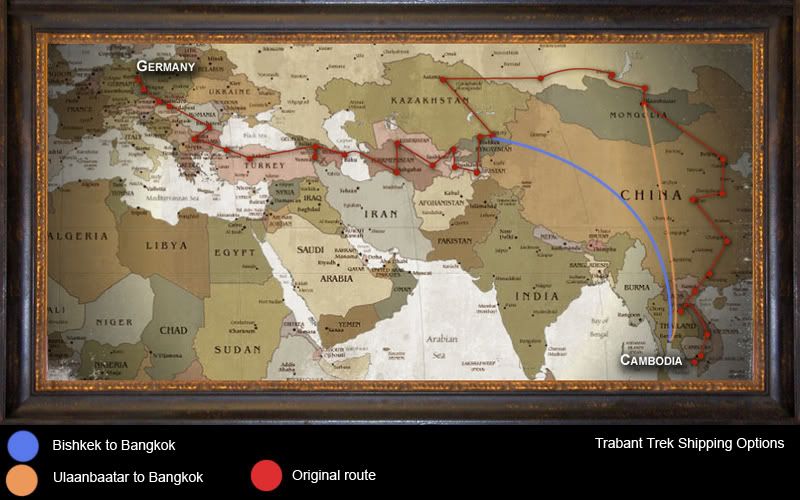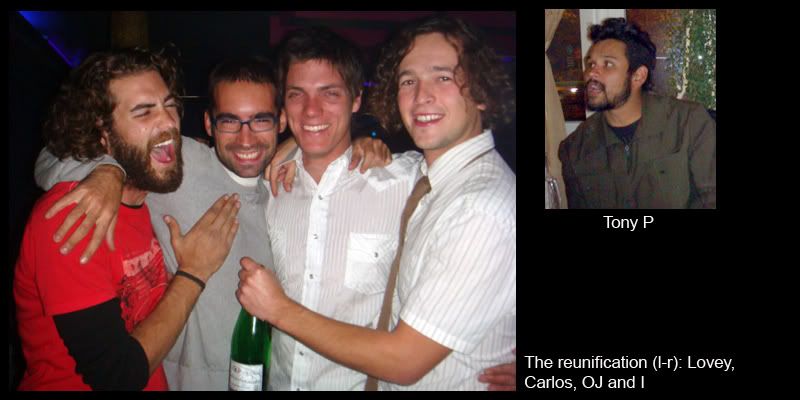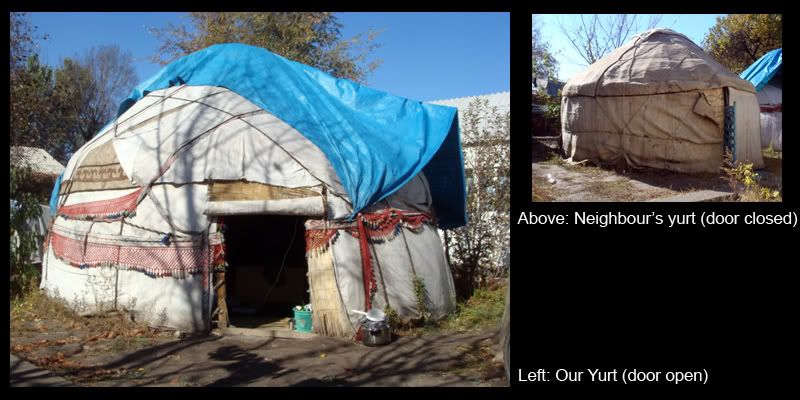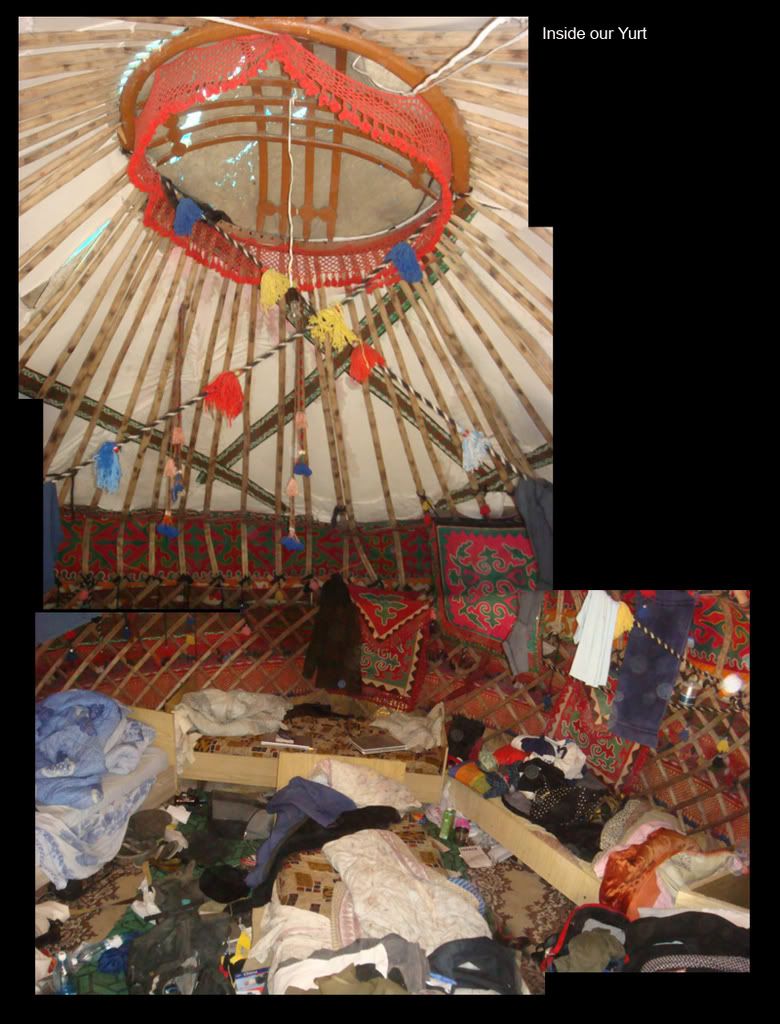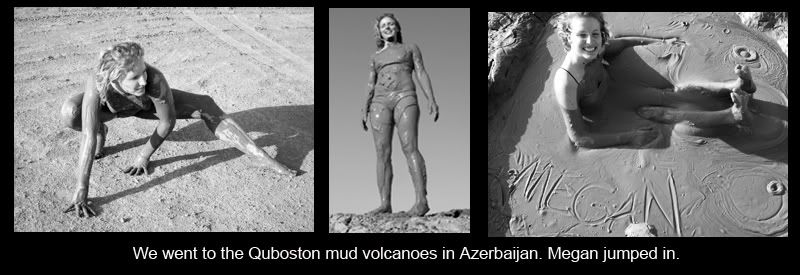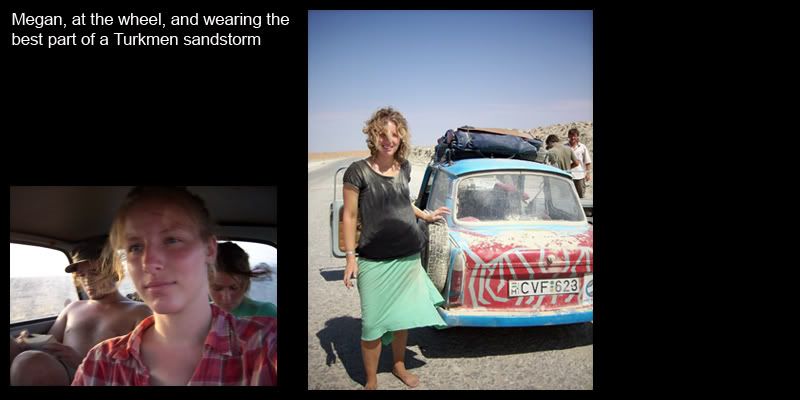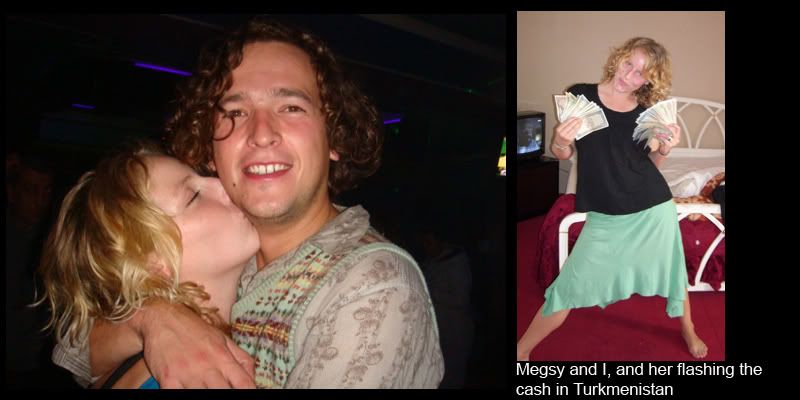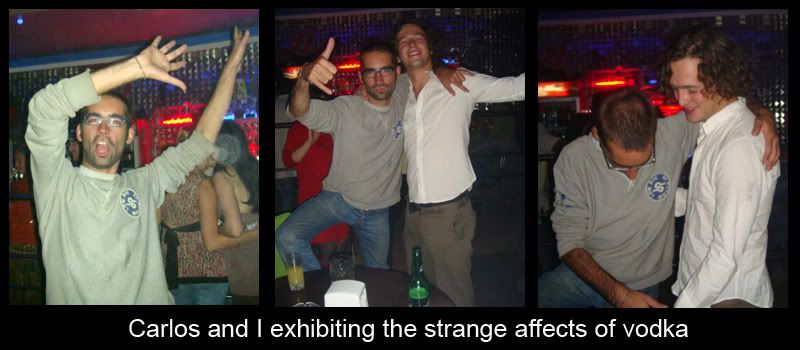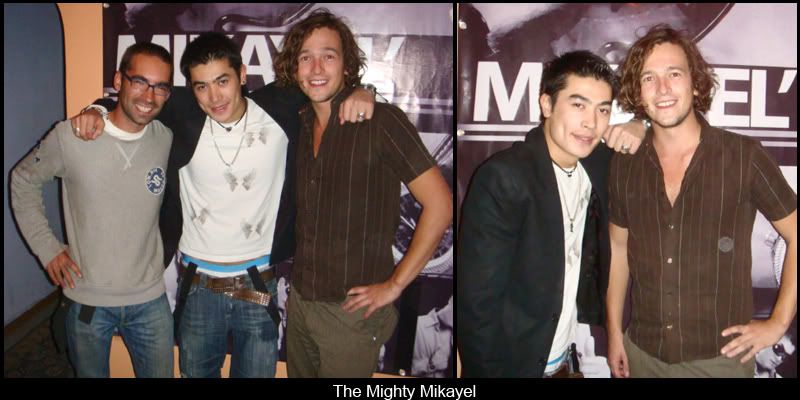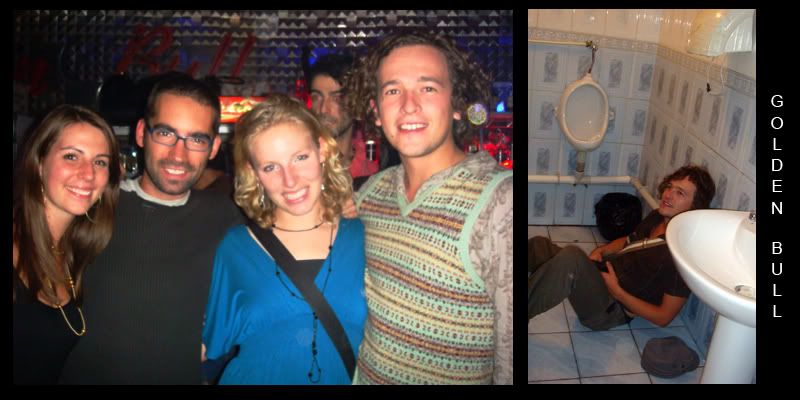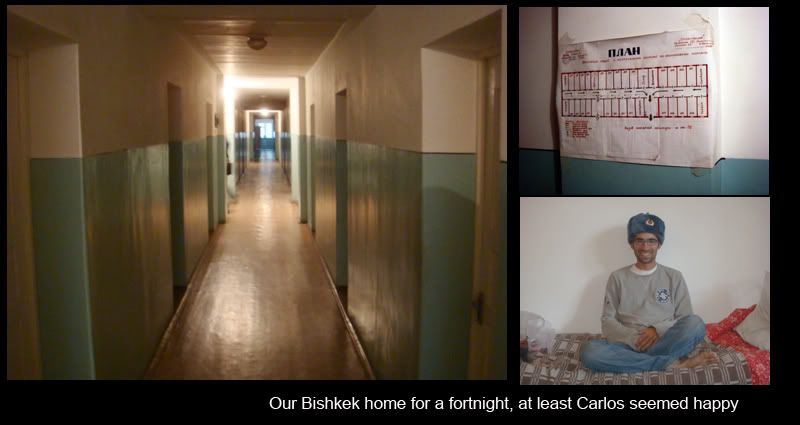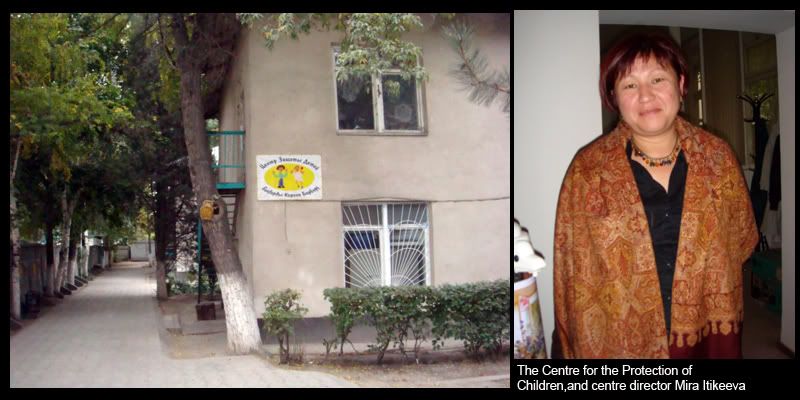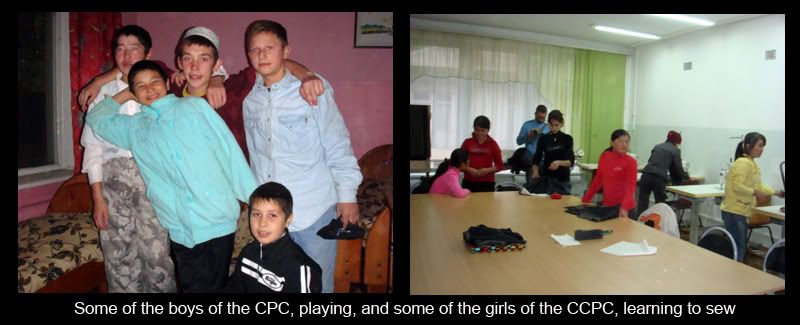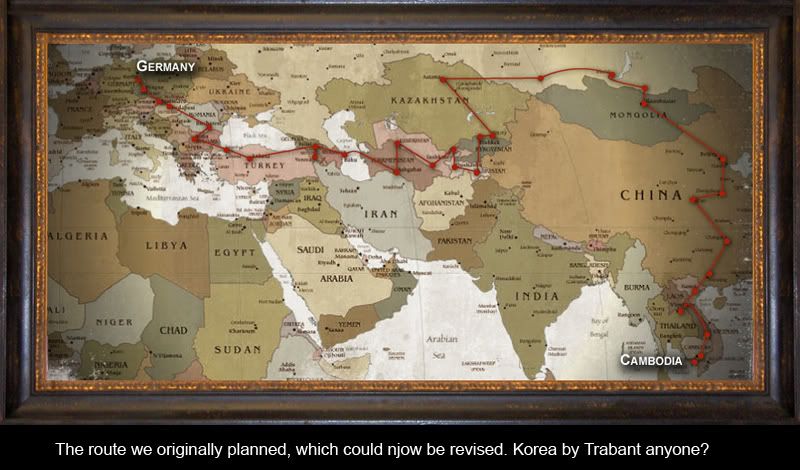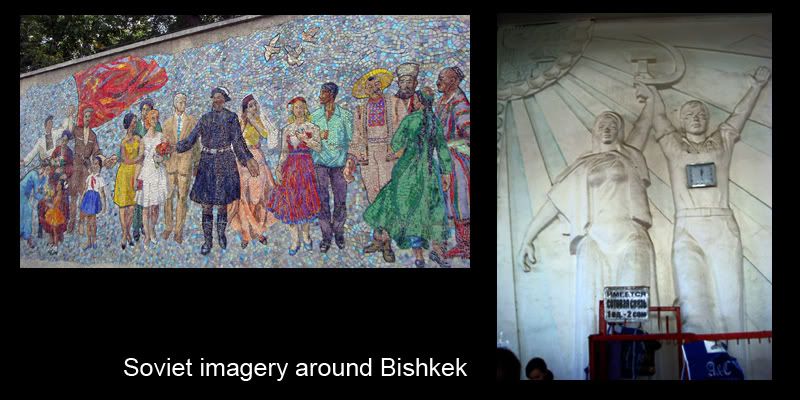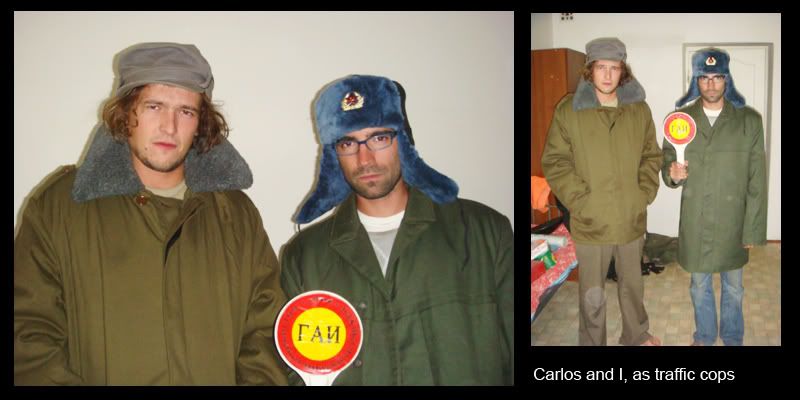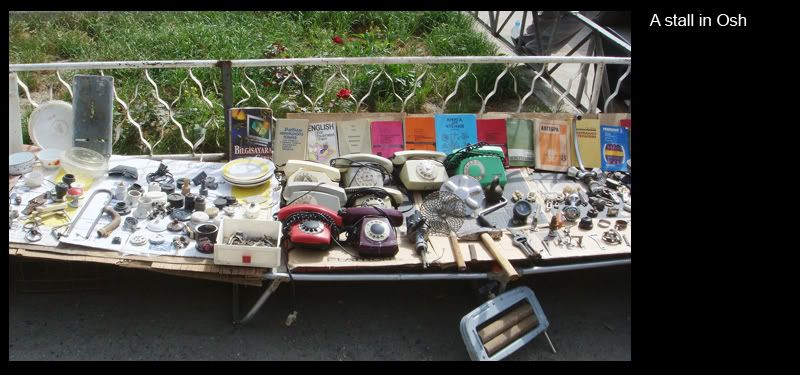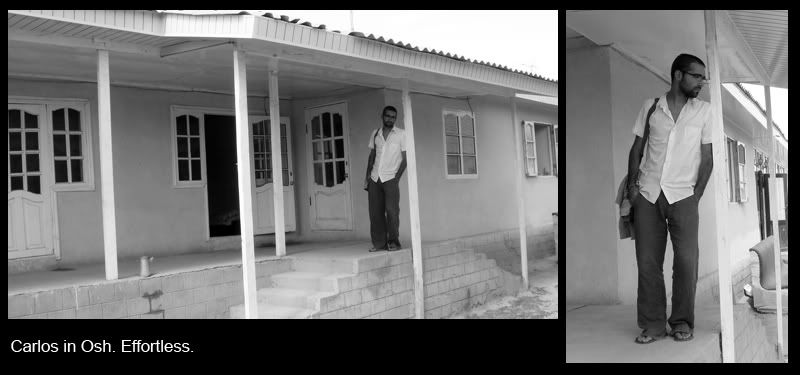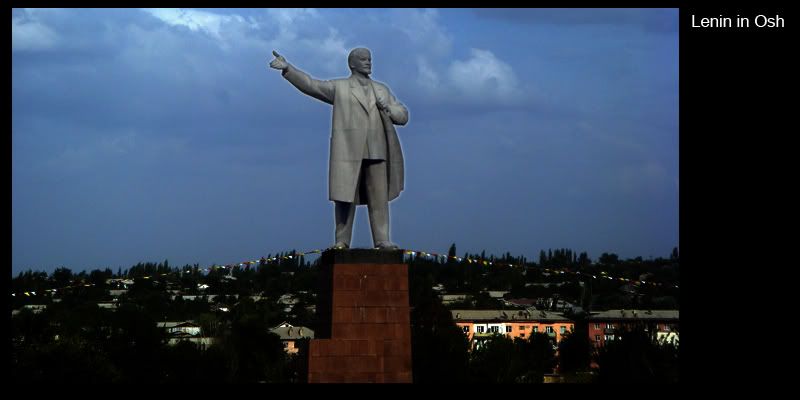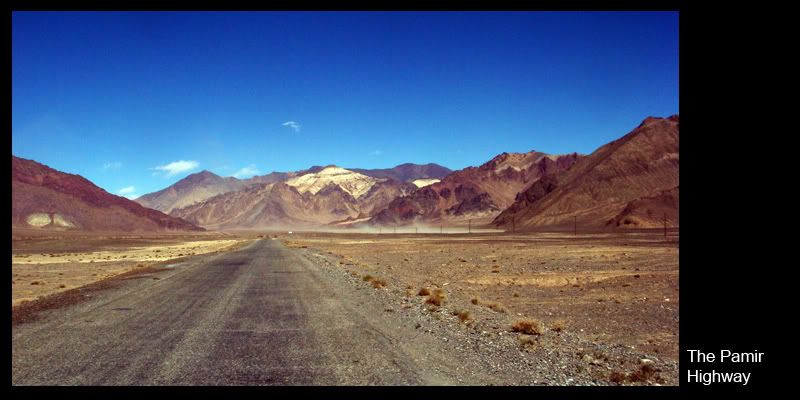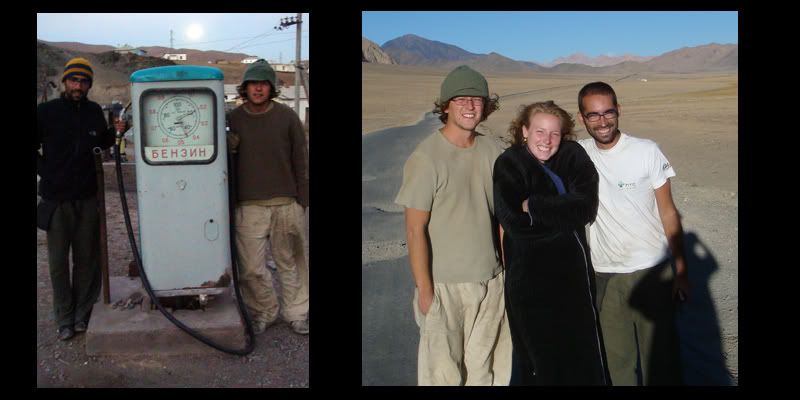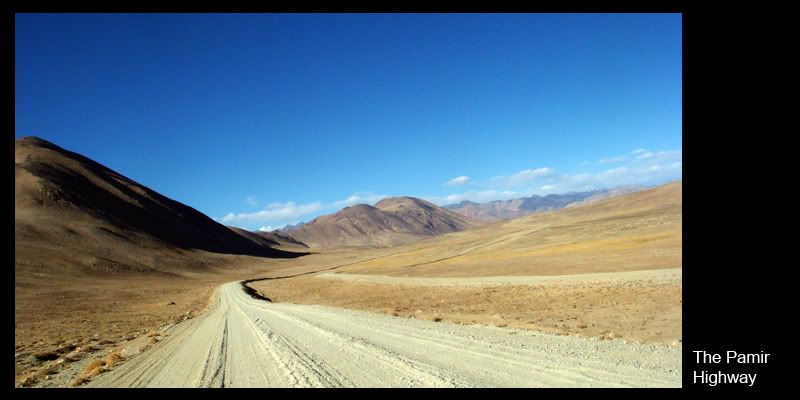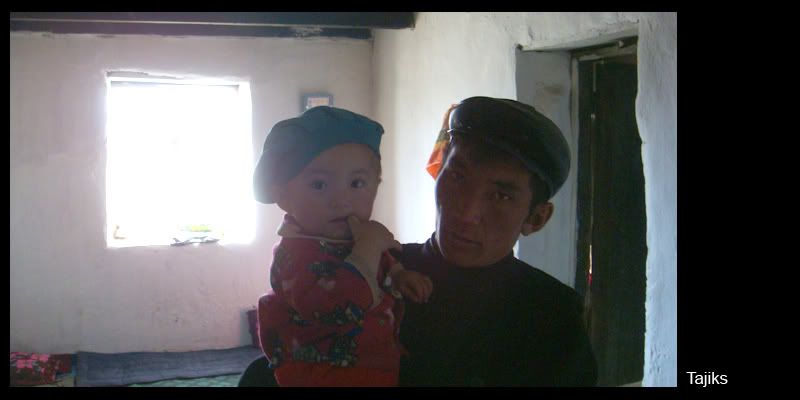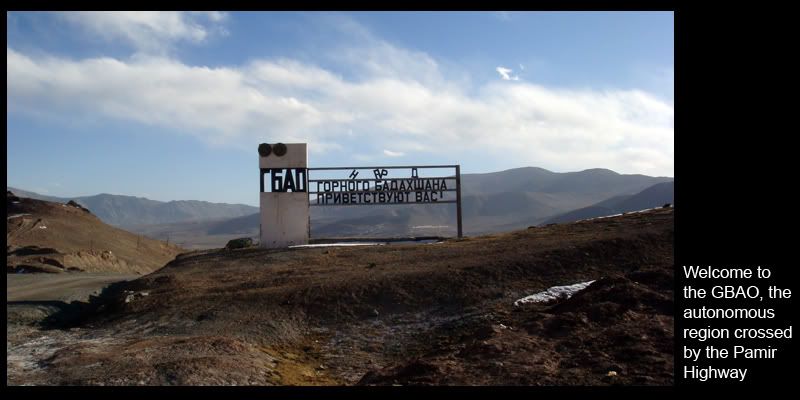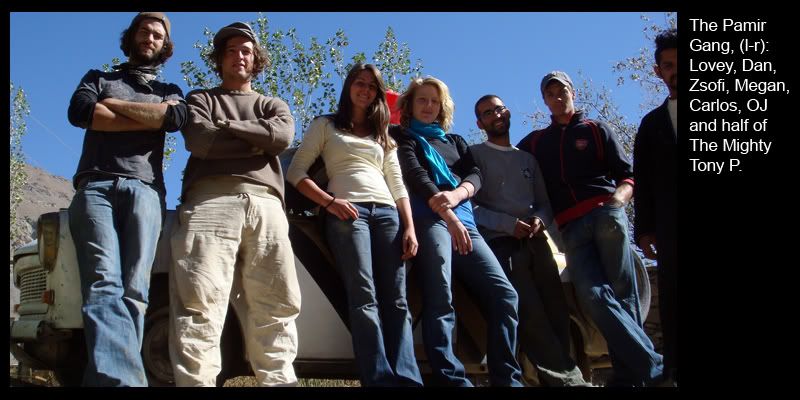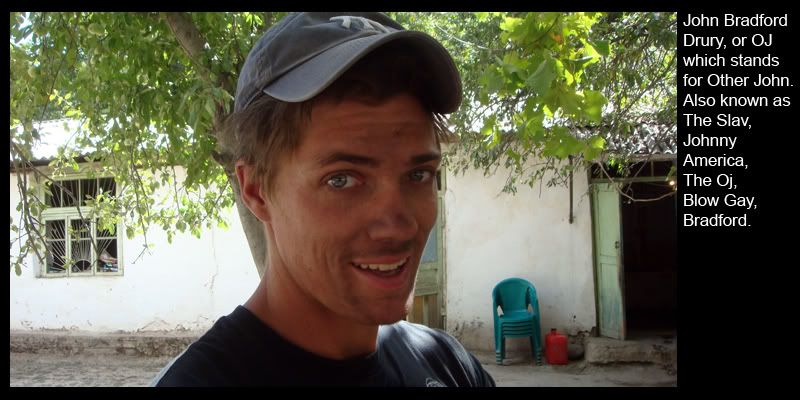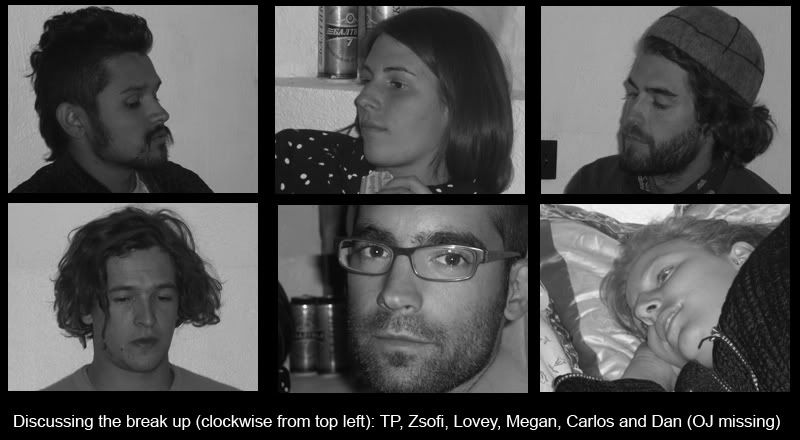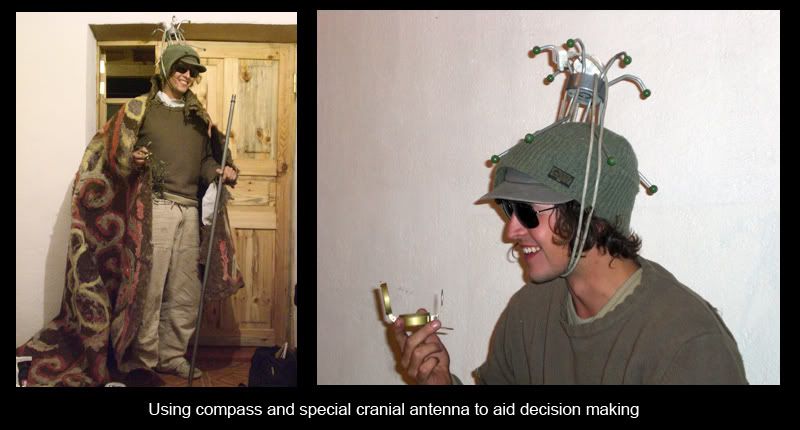Come in number four. Your time is up.
Mountains, Tajikistan18th-23rd September
by Dan Murdoch“So where did you go this summer?”
“Oh I spent a week on the Tajik-Afghan border actually. Lovely part of the world.”
IF WE were going to make it across the Pamirs in six days, we needed everything to run smoothly. So within a few hours of leaving Dushanbe, Dante broke- the clutch plate smashed to pieces.
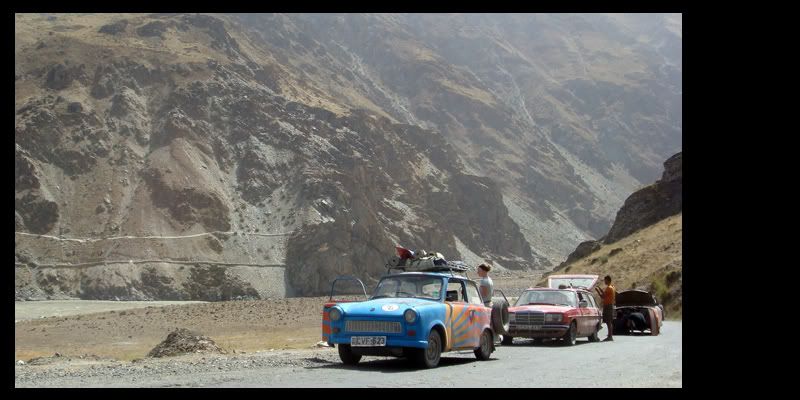
We parked up by the road and slept. TP, OJ and Carlos dealt with it the next day – it took until 4pm, then we set off again, already two thirds of a day behind.
I led in Fez, asking the bemused locals for directions. A bearded man on a horse with a long stick guided us some of the way, our progress so slow that he kept overtaking. In one hamlet I pulled up beside a hunched old man wearing long robes. He had been staring at us intensely.
“Khorog?” I asked.
“Khorog?” he spat back, then his craggy face broke into a mad toothless cackle: “Khorog? Khahahahkahahakahaha,” and he waved us down a dirt track.
The roads were in a shocking condition, and 20km into the drive Ziggy started having battery problems. We made ragged progress and ended up towing him to the nearby town of Cigar. Tony and OJ spent a long time looking at the car, but we decided we needed a new battery, and it was getting too dark to tow the thing on the rough, cliff hugging roads. So again we bedded down to sleep on the trail, having covered just 30km all day.
I spent the whole night fighting running battles with a gang if guerrilla street ants. I met their scouts within minutes of rolling out my mat, outside next to Fez. I flicked them away, but they returned with reinforcement, and I only woke when my position was overrun. There was little choice but to retreat, but the crafty buggers had trapped me between the mined Pyanj riverbanks and the lorry track road. Out thunk by a colony of Tajik mountain ants.
I squeezed myself between the front of Fez and the back of Ziggy- but was absurdly paranoid that someone would wake up in the morning, pull away and crush me. Wearing a blindfold and earplugs it was feasible that I wouldn’t hear them, and I jumped throughout the night thinking the Trabbis were moving.
After a turbulent few hours I was forced up with the rest of the trekkers, and found I’d been a banquet. The ants had feasted on all exposed skin- hands, wrists, neck and face- they’d even found their way to the exposed flesh between my jumper and my trousers, leaving a line of inflamed welts across my stomach that itched like buggery for a week.
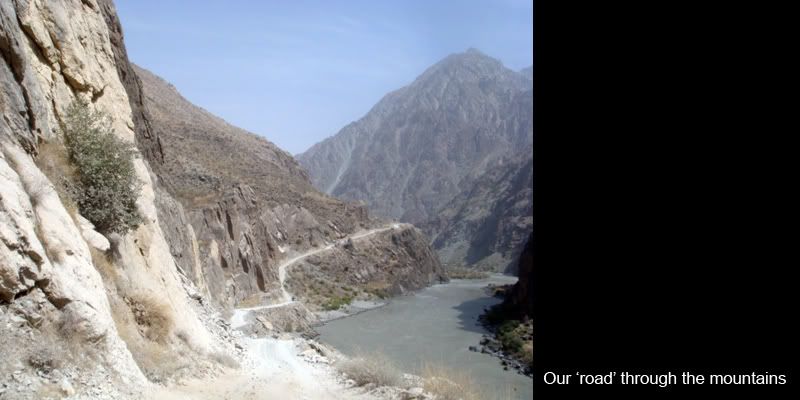
Our route took us along the Pyanj River, the border between Afghanistan and Tajikistan, and as we made our stop-start progress the Afghanis gazed at us over the water. Just a hundred meters of milky blue rapids divided us, but it could be a hundred years. On the Afghan bank, laden donkeys plod along rough paths cut into the mountainside, the trail propped up in places by piles of uncut shingle. Many of the men wear traditional robes, and have cloth wrapped around their heads. They support their weight with crooked shanks and return to homes made from piles of boulders loosely wattled together.
On our side we drove along a paved road, passing 4x4s, people carriers and Russian Kamaz lorries. Many of the kids have football shirts, mostly Real Madrid, and go to school in whitewashed buildings with corrugated roofs courtesy of the Agha Khan Foundation.
The water here flows fast, coming quickly down from the high peaks, and the boulder strewn riverbed forms impressive and noisy rapids, swarming with battling eddies and counter currents.
During a quest for engine oil I asked a local if it is possible to swim across, he held an imaginary rifle up to his shoulder and let off a few phantom rounds into my chest.
It would be great to touch Afghanistan. I'm not sure why, but we all had a strong urge to go to the place. I settled for throwing rocks onto the Afghan side of the stream and sharing cheers and waves with the Afghan’s I could attract.
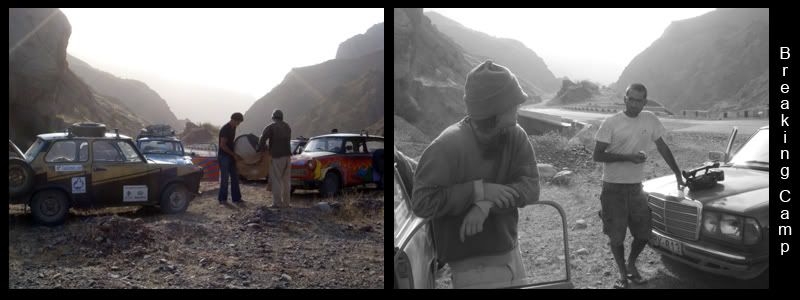
Cigar had a surreal stretch of perfect paving running through it- a stark contrast to the rough, winding tracks we had been following through the mountains, and for a while we hoped the road might stay like that for a few hundred kilometres.
But within a few Ks of leaving we were back on the potholed paths, ripe for breakdowns.
We found a new battery for Ziggy, breakfasted, filled up on petrol and got back into the cars with a sense of hope that we could really push on for Khorog. It was going to be a great day.
But ten kilometres later the clutch went on the Mercedes. We tried to soldier on by pumping it, but no good- the plate was wrecked. We got a tow back into town and spent another day and night with a mechanic getting it fixed. It cost us $40, but we ate well, and were in good spirits when we headed off early the next morning. We joked that our new target wasn’t Khorog, but to get more than 30 km in one sitting- something we’d yet to achieve in the three days we’d been trying for the Pamirs.
But half an hour later, and just 20km in, the oil pan went on the Mercedes. We took it well and spent four hours patching the thing up on the side of the road.
We set off again shortly after 4pm, four days into what should have been a 20-hour drive, wondering if we would ever make it out of the mountains.
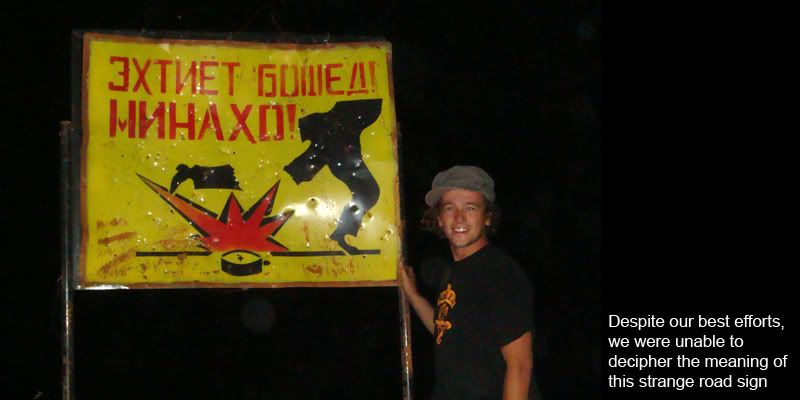
A white 4x4 from the UN passed us as we were push-starting Ziggy. They were in the area as part of the World Food Programme, and were checking that local schools were handing out the amount of food that they claimed.
Their car’s exhaust had been redirected through a chimney that towered high above the engine- an ominous warning of how high the rivers can get.
I asked one of the UN guys for some guidance with our route. All good was the verdict, the roads were passable.
What about the proximity to Afghanistan?
“It’s safe. There used to be fighters coming over until ‘97, but after that none.”
In 1997 Tajikistan’s civil war ended. The rebels, who lost, had been supported by the Mujahadeen in Afghanistan. The Afghan’s had flooded across the porous national divide to provide men and arms. Now they do the same to provide drugs- heroine and opium. Tajikistan is one of the world’s biggest confiscators of narcotics, 19kg of heroin was seized while we were there.
“There are still mines though. Don’t go off the roads between here and here,” he gestured at a large section of the map. There was a lot laid during the war.”
As we wound our way through the valleys we saw the detritus of conflict- the odd burned out armoured personnel carrier, tank tracks, abandoned military installations. Every few miles we would pass another pair of soldiers- ridiculously young lads, fresh faced without hints of stubble, carrying machine guns and patrolling the border.
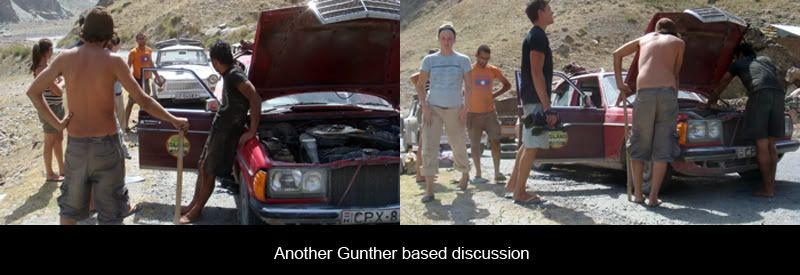
We managed just ten painful kilometres before the Great Red Gherkin’s clutch went again, and a new hole appeared in the oil pan.
It was too much. TP started hitting the car with a stick. He had hated the thing ever since we got it, but had resolutely nursed it across half of Eurasia. But those last few days had been its final chance. Tajikistan proved the better of it. We had to dump it.
In retrospect old Gunther probably wasn’t the best car to attempt the Pamir Highway in- as Lovey said: “This thing was built for German families to drive along the Autobahn.”
Not ideal for attempting some of the highest, most rugged roads on the planet.
But still, we felt let down. We’d tried so hard to get the Red Baron across- it had cost us so many days and so much money. But we couldn’t keep going.
We decided to strip it of anything of use and leave it by the road.
It was a strange situation. Parked precariously at a passing point in a road that looked chiselled into a huge cliff face. The river gushed noisily 40 feet below us, and every hour another Kamaz would squeeze past us.
Night fell quickly- making the job of unloading and repacking all the cars that little bit more exciting.
To take the spare Trabbi parts we needed from Gunther we had to dump anything we could. Overloaded Trabbis were more likely to break down and less likely to make it over the mountains.
We had a mass clearout then stripped Gunther of anything useful- battery, alternator, fuses, seat belts for towing, petrol, rear view mirror- we salvaged all we could.
After hours of organising, repacking, discarding and debating, we were ready. We said our goodbyes to Gunther, held a mock wake, closed the doors and left the keys in the ignition. It would be of use to someone round here.
We pulled the cars into formation, revved up and set off- Dante, Fez then Ziggy.
But Ziggy didn’t move. He started, stalled, then died.
The new battery was kaput. We weren’t going anywhere.
Half of us went to sleep, half of us worked on installing a new alternator.
We woke early, did final checks, and set off minus one Mercedes. It was strange looking behind and not seeing the lumbering beast following us. I’d love to know where it is now. Whenever we went to get it repaired someone would offer to buy it off us for a pittance- so I'm sure it is being put to use.
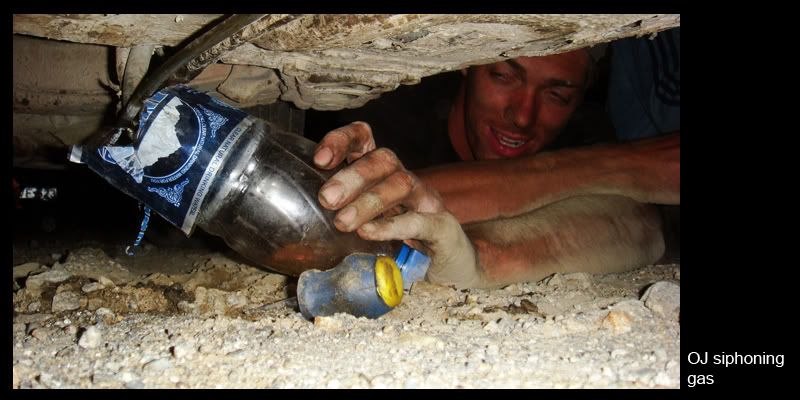
Morning’s in the mountains are always cold, but as the sun stretched out and the shadows retreated I began removing jumpers and settling into the view from the back of Fez.
Megan was driving, we were leading and the ride was terrible. We hit some almighty bumps- two in particular that flung the car in the air, probably the worst bumps we’d hit. At one point I heard a loud, twanging snap from beneath me. I assumed it was the springs in the seat going and didn’t mention it.
We kept getting ahead of the convoy, and Megan would throw a mini hissy fit. She’d stop the car, looking angrily behind her and snarling: “Where the fuck are they? Why can’t they keep up today? Why are they driving like grandmas?”
Her lack of composure when things aren’t going right is probably the thing that winds me up the most.
I suggested she was driving a little fast and we should try to keep together.
“I'm not even driving that fast,” she snapped.
During one particularly vicious bump our exhaust became detached and for a few hundred metres we used it as a impromptu plough.
Ten minutes later we realised the exhaust had been shaken loose by the jolting and when TP had a look he saw that Fez’s left side had slumped. After a record-breaking 100km stint, the rear left control arm had snapped. I was pissed off with Megan. I felt she’d been driving recklessly because she was in a mood and, maybe unfairly, decided she’d broken Fez.
We found a welder, but it was a huge break, and it is clear it will keep reappearing over the next two months- the sort of niggling injury that really slows you down. I was angry.
I wondered into a nearby field to try and draw out my frustration. OJ found me and we sat beneath the shade of a pear tree. A woman from the farm came over and offered us some freshly washed tomatoes. A few minutes later her toddling son came out with a tray of walnuts, and then a loaf of sliced bread. TP turned up and we sat and ate, using greasy, oily hands- unwashed in five days. The woman’s husband came home and demanded we step inside for tea. She put on a wonderful spread of dried berry’s, almonds, biscuits and toffees, with more bread, tomatoes, walnuts and tea.
They wanted nothing, they didn’t even join us to eat- just saw dirty, unkempt, foreigners and did what they could to ease our burden and show their hospitality.
The gesture filled me with warmth and again I wondered at the kindness we’ve been graced with for so long now.
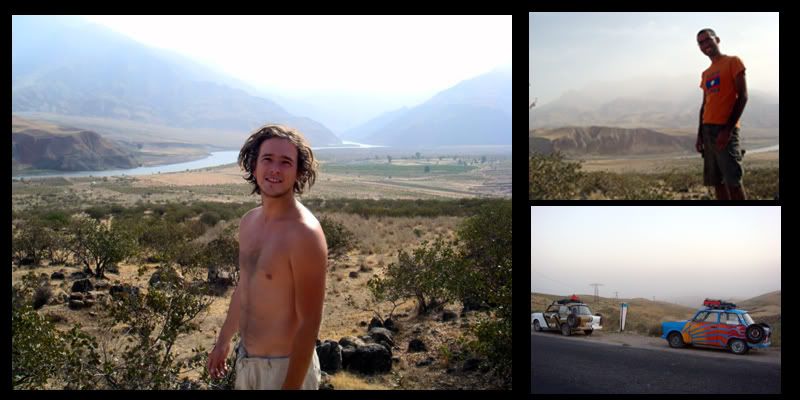
The weld was done quickly and we made it to Khorog. It had taken five days to get 400km. A demoralising nightmare and without a doubt the hardest leg of the trip so far, we had to ditch a car and a load of equipment to make it. And we hadn’t even reached the Pamir Highway. How would we handle that, especially with even less parts and even more weight, in the unforgiving, isolated Pamir Mountains, where the passes reach three miles high and the temperature drops well below freezing.
We booked into a guesthouse and ate mountain food. Tomorrow we would stock up on supplies and head for the hills.
Ends
mrdanmurdoch@gmail.com
You can read more of Dan’s blogs at: danmurdoch.blogspot.com or www.trabanttrek.org
